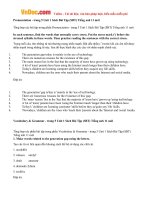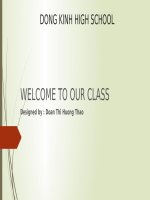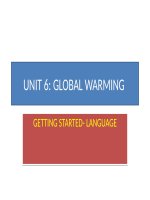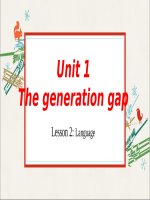Unit 1. The generation gap. Lesson 2. Language
Bạn đang xem bản rút gọn của tài liệu. Xem và tải ngay bản đầy đủ của tài liệu tại đây (478.7 KB, 18 trang )
DONG KINH HIGH SCHOOL
WELCOME TO OUR CLASS
11A1
Designed by : Doan Thi Huong Thao
UNIT 1: FAMIL LIFE
LESSON 2: LANGUAGE
• There are 3 parts in this lesson.
1. VOCABULARY: COMPOUND NOUNS
2. PRONUNCIATION: STRESSED & UNSTRESSED WORDS IN
SENTENCES
3. GRAMMAR:
* SHOULD/ SHOULDN’T TO GIVE OPINIONS ABOUT
SOMETHING OR ADVICE TO SOMEONE.
* MUST & HAVE TO ARE USED TO EXPRESS OBLIGATION
I. VOCABULARY: COMPOUND NOUNDS
1/ MATCHING:
1. Nuclear
a. styles
2. generation
b. drinks
3. table
c. food
4. house
d. steps
5. junk
e. children
6. soft
f. hold
7. hair
g. family
8. foot
h. gap
9. school
i. manner
COMPOUND NOUNS
• Compound Nouns are words for people, animals, places, things,
or ideas made up of 2 or more words.
• Most compound nouns are made with Nouns that have been
modified by Adjectives or other Nouns.
• Compound nouns are sometimes ONE WORD: toothpaste
• Compound nouns are connected with a hyphen: dry-cleaning/
daughter-in-law
• Compound nouns appear as TWO SEPERATED WORDS :
full moon/ Christmas tree
1. Compound noun = 1N+ 1N
bus stop
2. Compound noun = 1Adj+ 1 N full moon/
blackboard
3. Compound noun = 1V+ 1N washing machine/
4. . Compound noun = 1N + 1V:
sunrise
5. Compound noun = 1V+ 1 Prep checkout
6. Compound noun = 1 N+ 1 Prep phrase motherin- law
7. Compound noun = 1 Prep + 1 N: past lives
8. Compound noun = 1 N+ 1 Adj:
truckful
2. Complete each question with one of the compound nouns in 1
1.Have your parents ever complained about your
______________?
2.Why is there a ___________between parents and
children?
3.Is the _____________________the perfect type of
family?
4.Why are soft drinks and __________ not good for our
teeth.
5.Do you think ____________ should wear uniforms?
2. Complete each question with one of the compound nouns in 1
1.Have your parents ever complained about your
______________? Hairstyle/ Table manner
2.Why is there a _____ ___________between parents and
children? Generation gap
3.Is the _____________________the perfect type of
family? Nuclear family
4.Why are soft drinks and __________ not good for our
teeth. Junk food
5.Do you think ____________ should wear uniforms?
School children
II. PRONUNCIATION
1. LISTEN AND REPEAT THE STRESSED WORDS WITH THE MARK (‘) BEFORE THE
STRESSED SYLLABLES
• 1. If you can i’dentify your ‘differences with your ‘parents, you can
‘have a good re’lationship.
• 2. You should be res’pectful when dis’cussing any ‘areas of
disa’greement.
• 3. ‘Take time to ‘listen to your ‘parents’ o’pinions, and ‘ask them to
‘listen to ‘yours.
• 4. Being ‘rude to your ‘parents ‘won’t con’vince them you’re ‘right.
This can ‘have the ‘opposite ef’fect.
• 5. How can ‘parents sup’port their ‘children through the ‘bad times.
PAY ATTENTION TO THE WORDS UNDERLINED AND IN BOLD.
ALL THESE WORDS ARE STRESSED
1. IDENTIFY/ HAVE/ TAKE/ LISTEN /
• 1. VERBS
DISCUSSING/ ASK/ CONVINCE/ SUPPORT
2. DIFFERENCES/ RELATIONSHIP/ AREAS/
DISAGREEMENT/ PARENTS/ OPINION/
OPPOSITE/ CHILDREN/ TIMES/ EFFECT
3. GOOD/ RESPECTFUL/ RUDE/ / RIGHT/ BAD
4. WON’T
5. HOW
6. YOURS
7. THIS/ THAT/ THESE/ THOSE
• 2. NOUNS
3. ADJECTIVES
4. NEGATIVE AUXILARIES
5. QUESTION WORDS
6. POSSESSIVE PRONOUNS
7. DEMONSTRATIVE
PRONPOUNS
II. PRONUNCIATION
2. ARE THE WORD IN BOLD STRESSED OR UNSTRESSED ? LISTEN AND CHECK
1. A. When did you start to help your parents with the
housework?
B. I don’t remember exactly when I started to help them.
Perhaps at the age of five or six.
2.A. These shoes look really cool. Would you like to try them on?
B. No. I don’t like them. I like those shoes over there.
3.A. Do you think their parents are the best teachers?
B. yes, I do. They are more mature and experienced, so they
will always give us the best advice.
III. GRAMMAR.
1.Giving our opinions about something or advice to someone, we use :
SHOULD/ SHOULDN’T or OUGHT / OUGHT NOT TO
a/ Should: Describe what the speaker thinks is the right thing or the best
thing to do, describe the gentle advice
Example: I should do morre home work ( my opinion)
You shouldn’t sit to close to the TV. It’s bad for your eyes
b/ Ought/ Oughtn’t to: express the compulsion The person who said the
order, but not sure people listen to or not.
Example: You ought to apologize.
You oughtn’t to neglect your studies.
2. Must & Have to
a/ Must: Describe the obligation to do something, no choice .
Ex: You must endorce a check beore you cash it.
Must: Expresses the strong mandate usually spoken by the speaker
Ex: I must get my hair cut
• Mustn’t: express the prohibition.
Ex: You must’t carry your gun
b/ Have to : Describe the strong force coming from outside such as law,
school rules, office ...
Ex: You have to have a driving licence if you want to drive a car.
*Don’t/ Doesn’t have to: Describes voluntary, unnecessary.
Ex: You don’t have to do the washing up. I’ve got a dishwasher.
UNDERLINED THE CORRECT WORDS TO COMPLETE THE SENTENCES
1.I think you should / shouldn’t talk to your parents about it.
I’m sure they will give you the best advice.
2.I don’t think you ought / oughtn’t to do your brother’s
homework. He must do it himself.
3.You must / mustn’t finish your homework before you go
out with your friends.
4.At our school, we have to / don’t have to wear uniforms. It is
a rule.
5.You mustn’t/ don’t have to take photographs here. This is s
restricted area.
Rewrite each sentence without changing its meaning, using the words in brackets.
1. 1. It would be a good idea for you to talk to your parents about your problem. (OUGHT)
3. It’s not necessary for me to type my essay. (HAVE TO)
REWRITE EACH SENTENCE WITHOUT CHANGING ITS MEANING, USING THE WORDS IN
BRACKETS.
• 1. It would be a good idea for you to talk to your parents about your problem. (OUGHT)
You ought to talk to your parents about your problem
• 2. You are not allowed to use your mobile phone in the examination room. ( MUST)
• You mustn’t use your mobile phone in the examination room.
3. It’s not necessary for me to type my essay. (HAVE TO)
I don’t have to type my essay.
• 4. I’d advise you to tell the truth to your family. (SHOULD)
• You should tell the truth to your family
• 5. It’s necessary for young people to plan their future career carefully(MUST)
•
Young people must plan their future career carefully
CONSOLIDATION
•1. Distinguish between compound nouns and
free combinations of words.
•2. Identify the stressed and unstressed words
in a sentence and pronounce them correctly.
•3. Can use Should and Ought to to give
opinions and advice; Must and have to to
express obligation
HOMEWORK
•1. Prepare the next lesson.
•2. Do the exercises in workbook
THANKS FOR PAYING ATTENTION









